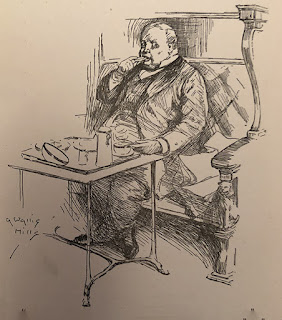In April of 1903, Sherlock Holmes had yet to return to the pages of The Strand Magazine.
Watson's agent was publishing Brigadier Gerard stories there, sure. But it would be five more months before Sherlock Holmes returned in "The Adventure of the Empty House" in the September issue. And yet, looking for something else this evening, I couldn't help but think Mycroft Holmes had made it into the Strand a few months before his more famous brother.
True, Mycroft Holmes had no Watson. He liked his Diogenes Club and spent his time there in silence. No discussions, no adventures, no reason for anyone to write about him at all. Except for maybe one thing.
"Heavily built and massive," Watson writes of Mycroft, "there was a suggestion of uncouth physical inertia in the figure, but above this unwieldy frame there was perched a head so . . . [compliment, compliment, compliment] . . . that after the first glance one forgot the gross body and remembered only the dominant mind."
Well, Watson certainly remembered that "massive" and "gross" body to mention it in his work. Another writer, who it seems might have met Watson at the Diogenes, was not nearly so kind.
"Great uneasy jelly of substance! The fattest clubman in London."
That writer? H.G. Wells.
Things were different in 1903, and not always kind to those of us with a bit more of a belly than we should have -- even though many a local strong man was not the washboard abs type back then. Still, reading H.G. Wells's April 1903 contribution to Strand Magazine, you have to go . . . Welllllsss?
"The Truth About Pyecraft" is the name of his tale, and the name being a perfect parody for an overweight clubman named Mycroft seems just a bit too close for comfort.


An interesting bit of surmise. :-)
ReplyDelete